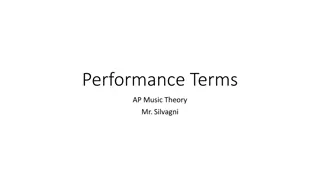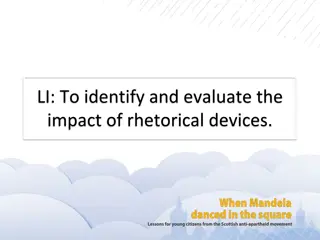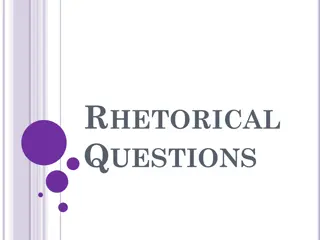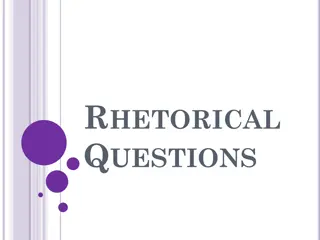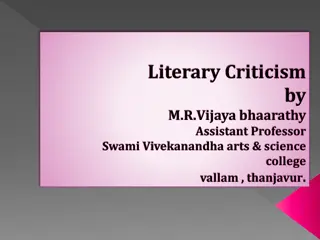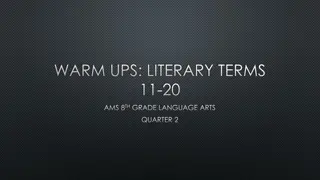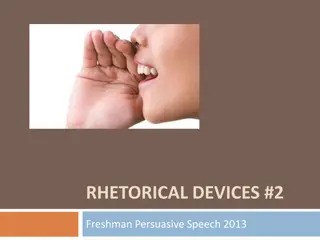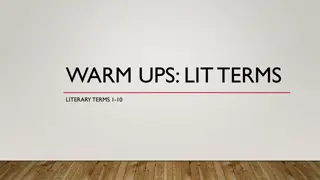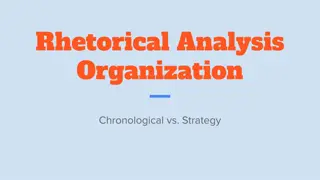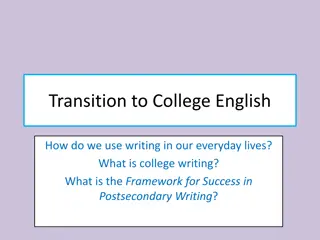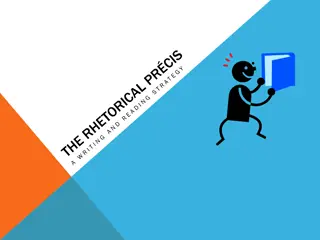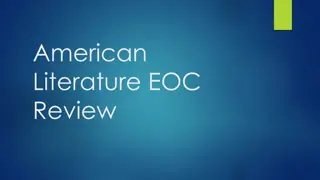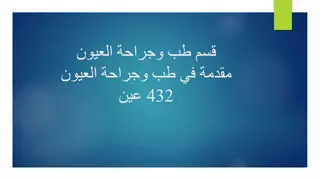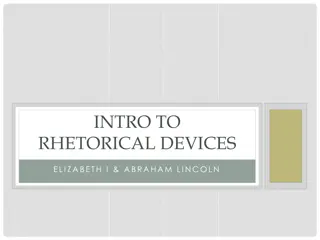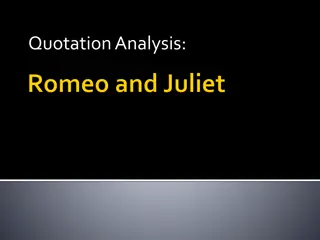Literary and Rhetorical Terms Explained: A Visual Guide
Dive into the world of figurative language with this comprehensive visual review of literary and rhetorical terms. Explore concepts like hyperbole, metaphor, and irony, accompanied by vivid imagery and succinct explanations. Enhance your understanding of literary devices and their usage in writing and communication.
Download Presentation

Please find below an Image/Link to download the presentation.
The content on the website is provided AS IS for your information and personal use only. It may not be sold, licensed, or shared on other websites without obtaining consent from the author.If you encounter any issues during the download, it is possible that the publisher has removed the file from their server.
You are allowed to download the files provided on this website for personal or commercial use, subject to the condition that they are used lawfully. All files are the property of their respective owners.
The content on the website is provided AS IS for your information and personal use only. It may not be sold, licensed, or shared on other websites without obtaining consent from the author.
E N D
Presentation Transcript
Final Exam Review 11thGrade
Figurative Language Figurative language = language that is not literal. It is used to express complex ideas and emotions.
Allusion Reference to another work of literature or art, history, or current event.
Hyperbole Deliberate exaggeration/overstatement Example: Her beauty could end wars.
Understatement Framing something as less important for satiric or comic effect. To make light of something for a purpose. EXAMPLE: The grave s a fine and private place,/But none, I think, do there embrace.
Imagery Language that appeals to the senses. Not just eyes! Descriptions of how something looks, tastes, feels, sounds, smells that helps readers experience what they read. I will speak daggers to her but use none! -Hamlet
Metaphor A complex comparison that implies that one thing is another thing. EXAMPLE: Gatsby is a little tiny boat, paddling against the current in the closing lines of The Great Gatsby
Analogy A comparison that helps a writer explain something in other terms. EXAMPLE: There is Mr. Marblehall s ancestral home. It s not so wonderfully large it has only four columns but you always look toward, the way you always glance into tunnels and see nothing.
Irony Dramatic Irony tension between what a character says or thinks and what the audience knows to be true. Situational Irony the discrepancy between what you would expect and what actually happens. The opposite of what you d think. Example: police stations gets robbed Verbal Irony Sarcasm. Saying one thing, but meaning another.
Foreshadowing Future events are hinted at.
Point of View First person I (uses the pronoun) Second person You. Rare. It casts the reader as a character. Third person limited omniscient He/she. Knows thoughts of one character. Third person omniscient He/she. Knows the thoughts of all characters.
Diction (word choice) Connotation meanings/associations readers have with a word beyond the dictionary definition. Denotation dictionary definition
Paradox A statement that seems contradictory but actually is not. Example: Without laws, we would have no freedom. We fight wars for peace.
Rhetorical Question A question asked in order to make a point rather than to collect information
Symbol Something that carries more than its literal meaning. It represents something more significant.
Structure and Form Theme Plot Juxtaposition Chronology- sequence of events in time
Theme A statement (or two) or a question related to the human experience. NOT ONE WORD NOT A CLICH Example: In some cases, under extreme injustice, shy and otherwise quiet people may actively rebel in order to stand up for themselves. Example: If people feel imprisoned because of the expectations of conformity, they may resort to violent rebellion. Example: Major changes can occur in a person without him or her realizing.
Juxtaposition Arranging two things side by side for contrast, suspense, or character development. Example: To be, or not to be.
Rhetoric What do you know about it?
Its merely rhetoric! Rhetoric has a bad reputation To many people, the word rhetoric signals deception and trickery A politician wants to obscure a point An advertisement wants to manipulate a consumer It s just empty rhetoric But this is not entirely true! Rhetoric does not deserve this!
Rhetoric: Plain and Simple Aristotle defined it as the faculty of observing in any given case the available means of persuasion What tools do I have to communicate my idea or my opinion?
Rhetoric is all around us! Conversation even text messages! Movies TV shows Advertisements Books Body language Art We use it whether we re conscious of it or not. HOW??? HOW do I want to present this idea?
But if were conscious of it, we can use it to our advantage It can transform our speaking, reading, and writing. It can make us more able communicators and more discerning listeners.
The Rhetorical Triangle (Speaker) (Speaker)
The Rhetorical Triangle The hope is that what you say and write will be meaningful, purposeful, and effective. So, anyone creating a text/speech must consider three things
1. The Purpose/The Subject The subject (the main thing or idea) and the kinds of evidence used to develop it.
2. Audience Who is the reader? Who is listening? What do I know about the audience? their knowledge, ideas, attitudes, and beliefs
3. The Speaker The character of the rhetor How can the speaker use his or her personal character effectively? How do I want to present myself? As a victim? As an expert? As a friendly, open-minded person?
"Fans, for the past two weeks you have been reading about the bad break I got. Yet today I consider myself the luckiest man on the face of the earth. I have been in ballparks for seventeen years and have never received anything but kindness and encouragement from you fans. "Look at these grand men. Which of you wouldn t consider it the highlight of his career just to associate with them for even one day? Sure, I m lucky. Who wouldn t consider it an honor to have known Jacob Ruppert? Also, the builder of baseball s greatest empire, Ed Barrow? To have spent six years with that wonderful little fellow, Miller Huggins? Then to have spent the next nine years with that outstanding leader, that smart student of psychology, the best manager in baseball today, Joe McCarthy? Sure, I'm lucky. "When the New York Giants, a team you would give your right arm to beat, and vice versa, sends you a gift that s something. When everybody down to the groundskeepers and those boys in white coats remember you with trophies that s something. When you have a wonderful mother-in-law who takes sides with you in squabbles with her own daughter that's something. When you have a father and a mother who work all their lives so that you can have an education and build your body it's a blessing. When you have a wife who has been a tower of strength and shown more courage than you dreamed existed that's the finest I know. "So I close in saying that I might have been given a bad break, but I've got an awful lot to live for. Thank you."
Subject (and main idea)? His life threatening illness The Yankees and baseball in general His career I m the luckiest man alive
Audience His fans (They were shouting for him to speak!) His teammates His family Everyone in the stadium
Speaker? He presents himself as a common man, modest and glad for the life he s lived. He s not a polished orator, he s a champion baseball player.
SOAPSTone: A Strategy for Reading and Writing Speaker Occasion Audience Purpose Subject Tone
Speaker He presents himself as a common man, modest and glad for the life he s lived. It s more than a name
Occasion Gehrig delivered the speech between games of a doubleheader. It was two weeks after his diagnosis became public.
Audience His fans, teammates, and family
***Purpose*** To celebrate his athletic career and all of the other gifts that make him feel like the luckiest man alive. And to get back to work --to accept the challenges that lie before him. See how rhetoric can be sincere, too?
Subject His recent diagnosis The Yankees and baseball in general The things that make him feel lucky
Tone Tone = a speaker s attitude (not to be confused with mood. Mood = the feeling created by the work) Let s give it a try!
Some positive words to describe tone: Lighthearted Confident Amused Complimentary Amiable Relaxed Soothing Jubilant Encouraging Elated Passionate Romantic Calm Appreciative Loving Brave Reverent Whimsical Proud Energetic Ecstatic Optimistic Cheery Friendly
Some positive words to describe tone: Lighthearted Confident Amused Complimentary Amiable Relaxed Soothing Jubilant Encouraging Elated Passionate Romantic Calm Appreciative Loving Brave Reverent Whimsical Proud Energetic Ecstatic Fanciful Cheery Friendly
11TH - 12TH GRADE Final Exam Review-Grammar


![textbook$ What Your Heart Needs for the Hard Days 52 Encouraging Truths to Hold On To [R.A.R]](/thumb/9838/textbook-what-your-heart-needs-for-the-hard-days-52-encouraging-truths-to-hold-on-to-r-a-r.jpg)
